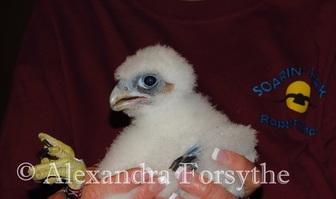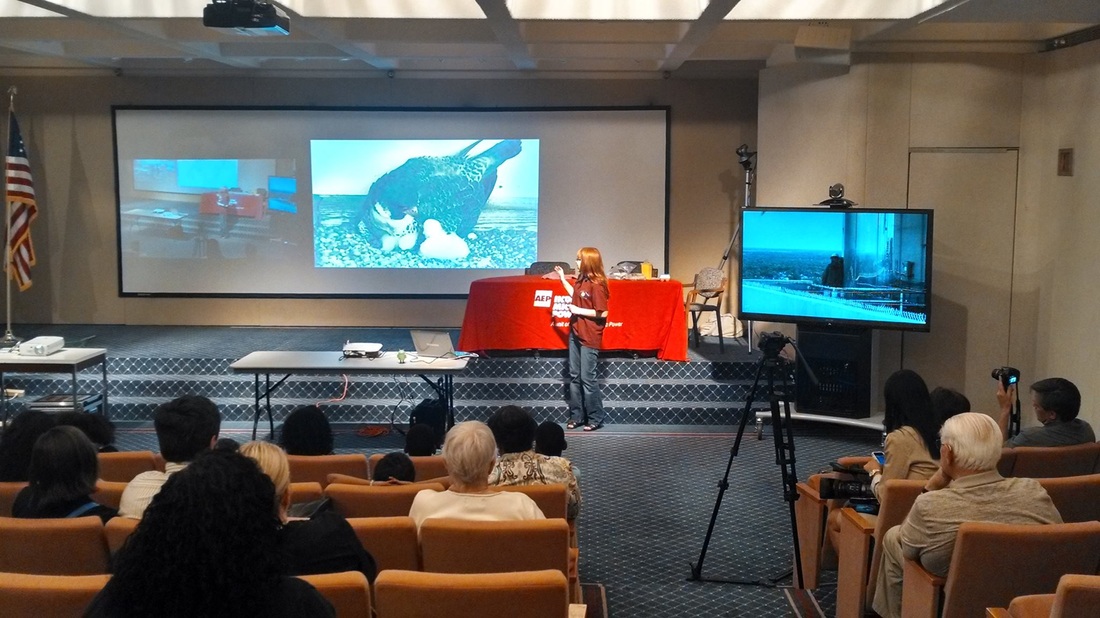
As storm clouds crept closer, John Castrale bravely climbed out onto the roof of One Summit Square in Fort Wayne, Indiana. The storm was the least of his concerns. Angry Peregrine Falcons relentlessly attacked him from the air. With their sharp beaks and talons, they were determined to remove the kidnapper who threatened to steal their chicks. The birds had a right to be upset; John Castrale was there to take their chicks away. However, his intentions were pure. He was only there to band them.
It was May 28 in Fort Wayne, banding day for the three Peregrine Falcon chicks. These chicks follow a long line of successful broods. Dozens of chicks have successfully fledged from One Summit Square thanks to the generous support of AEP, the DNR, and Soarin’ Hawk Raptor Rehab.
We’re very fortunate to have these birds in Indiana. As recently as 1965, there were no Peregrines nesting east of the Mississippi, and western populations had declined 90%. After DDT was prohibited and conservation groups like the Peregrine Fund were established, the Peregrines began to recover. Not until 1989 did Indiana have a nesting pair of Peregrines.
This year, all three of Fort Wayne’s chicks are male and they received their names the moment they were banded: Abbett, Magic and Cheetah. The names were chosen by the students of Abbett Elementary School in Fort Wayne, and many of students were on hand to witness the banding, applauding loudly when each name was announced.
When each chick is banded, blood is drawn from its wing for research purposes. They are dusted to cut down on the population of feather mites and they are checked for overall health. The sex of the chick is determined by the size of its feet and the thickness of the tarsus (as with most raptors, females are larger than males).
Nancy, an adult Peregrine who serves as an education bird, was introduced to the crowd by Soarin’ Hawk Raptor Rehab. It gave the audience a rare up-close look at these magnificent birds. I got to speak with the audience about the Peregrine’s amazing adaptations, like the tomial tooth and the tubercles that allow the bird to kill and fly with such skill.
After a brief walk around the room for photo opportunities, the chicks were returned to their parents, Jamie and Moxie. This year’s chicks appeared healthy and well on their way to becoming master hunters of the sky.
It was May 28 in Fort Wayne, banding day for the three Peregrine Falcon chicks. These chicks follow a long line of successful broods. Dozens of chicks have successfully fledged from One Summit Square thanks to the generous support of AEP, the DNR, and Soarin’ Hawk Raptor Rehab.
We’re very fortunate to have these birds in Indiana. As recently as 1965, there were no Peregrines nesting east of the Mississippi, and western populations had declined 90%. After DDT was prohibited and conservation groups like the Peregrine Fund were established, the Peregrines began to recover. Not until 1989 did Indiana have a nesting pair of Peregrines.
This year, all three of Fort Wayne’s chicks are male and they received their names the moment they were banded: Abbett, Magic and Cheetah. The names were chosen by the students of Abbett Elementary School in Fort Wayne, and many of students were on hand to witness the banding, applauding loudly when each name was announced.
When each chick is banded, blood is drawn from its wing for research purposes. They are dusted to cut down on the population of feather mites and they are checked for overall health. The sex of the chick is determined by the size of its feet and the thickness of the tarsus (as with most raptors, females are larger than males).
Nancy, an adult Peregrine who serves as an education bird, was introduced to the crowd by Soarin’ Hawk Raptor Rehab. It gave the audience a rare up-close look at these magnificent birds. I got to speak with the audience about the Peregrine’s amazing adaptations, like the tomial tooth and the tubercles that allow the bird to kill and fly with such skill.
After a brief walk around the room for photo opportunities, the chicks were returned to their parents, Jamie and Moxie. This year’s chicks appeared healthy and well on their way to becoming master hunters of the sky.

